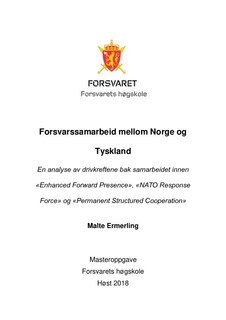| dc.contributor.author | Ermerling, Malte | |
| dc.date.accessioned | 2019-02-12T12:42:21Z | |
| dc.date.available | 2019-02-12T12:42:21Z | |
| dc.date.issued | 2018 | |
| dc.identifier.uri | http://hdl.handle.net/11250/2585029 | |
| dc.description.abstract | Det sikkerhets- og forsvarspolitiske samarbeidet innen FN, NATO og EU blir komplettert av mangfoldige bi- og multilaterale forbindelser. De siste årene har slike sikkerhets- og forsvarssamarbeid mellom mindre grupper av land, ofte kalt «minilateralisme», florert i Europa. Denne oppgaven vil bidra til å belyse årsakene til økningen i bi- og minilaterale samarbeid gjennom en nærmere casestudie av norsk-tysk bi- og minilateralt samarbeid. Det legges videre til grunn at statenes adferd skal kunne forklares gjennom mekanismer utledet fra de overordnede teoretiske tilnærmingene innenfor International Relations Theory (IR-teoriene). Disse er realisme, liberalisme og sosial konstruktivisme. Ubåtavtalen av 2017 er allerede belyst og analysert. Denne oppgaven skal derfor analysere tre andre, aktuelle bi- og multilaterale samarbeidsområder mellom Norge og Tyskland. De tre samarbeidsområdene som vil bli analysert er respektivt «Enhanced Forward Presence» (eFP), «NATO Response Force» (NRF) og «Permanent Structured Cooperation» (PESCO). For å kunne oppnå oppgavens målsetning, nemlig å gi fordypende kunnskap om bi- og multilaterale forbindelser mellom europeiske stater, og belyse deres bakgrunn og mulige implikasjoner for fremtidig samarbeid, skal følgende problemstilling besvares: Hva er hoveddrivkreftene bak samarbeidet mellom Norge og Tyskland innen eFP, NRF og PESCO? Oppgaven kommer frem til en rekke med konkrete drivkrefter. Disse er sterkt sammenfallende særlig for eFP og NRF. Innen PESCO kommer den også frem til noen divergerende drivkrefter. Oppgaven konkluderer med at det i disse tilfellene ser ut som samarbeid generelt mellom europeiske stater blir framtvunget av ytre realistiske drivere som den sikkerhetspolitiske situasjonen, nasjonalt begrensede (makt-)ressurser, osv. (altså samarbeid ja eller nei) mens de idealistiske og konstruktivistiske drivkreftene avgjør hvem som konkret jobber sammen og hvordan – altså utformingen av samarbeidet. Nærhet, likesinnethet, bestående samarbeid og dermed gjensidig tillitt og vennskap ser ut til å kunne ha en sterk forklaringskraft for at akkurat Norge og Tyskland gjensidig velger å samarbeide med hverandre og at det på dette grunnlaget kan antas at de kommer til å videre intensivere sitt bilaterale samarbeid. | nb_NO |
| dc.description.abstract | Cooperation in the field of security and defence policy within the UN, NATO and the EU is complemented by multiple bilateral and multilateral relations. In recent years, such security and defense cooperation between smaller groups of countries, often called "minilateralism", flourished in Europe. This thesis shall contribute to highlighting the causes of the increase in bi- and minilateral cooperation through a case study of Norwegian-German bi- and minilateral cooperation. It is further assumed that the behavior of states can be explained by mechanisms derived from the overall theoretical approaches within the International Relations Theory (IR theories). These are realism, liberalism and social constructivism. The submarine agreement of 2017 has already been elucidated and analyzed. This thesis will therefore analyze three other relevant bilateral and multilateral cooperation areas between Norway and Germany. The three areas of cooperation that will be analyzed are respectively Enhanced Forward Presence (eFP), NATO Response Force (NRF) and Permanent Structured Cooperation (PESCO). In order to achieve the objective of the thesis, namely to provide profound knowledge of bi- and multilateral relations between European states and to highlight their background and possible implications for future cooperation, the following question shall be discussed: What are the main driving forces behind cooperation between Norway and Germany within eFP, NRF and PESCO? The thesis uncovers a range of concrete driving forces. These are highly coinciding especially for eFP and NRF. Within PESCO, it also points out some divergent driving forces. The thesis concludes that in these cases, cooperation in general between European states is being forced upon them by external realistic drivers such as the security policy situation, nationally limited (power-)resources, etc. (meaning cooperation yes or no) while the idealist and constructivist drivers determine who specifically works together and how - meaning the design of the cooperation. Proximity, similarity, lasting cooperation and thus mutual trust and friendship seem to have strong explanatory power for that Norway and Germany mutually choose to cooperate with each other and that they on this basis might further intensify their bilateral cooperation. | nb_NO |
| dc.language.iso | nob | nb_NO |
| dc.publisher | Forsvarets høgskole | nb_NO |
| dc.subject | Forsvarspolitikk | nb_NO |
| dc.subject | Samarbeid | nb_NO |
| dc.subject | Minilateralt samarbeid | nb_NO |
| dc.subject | Bilateralt samarbeid | nb_NO |
| dc.subject | Tyskland | nb_NO |
| dc.subject | Norge | nb_NO |
| dc.title | Forsvarssamarbeid mellom Norge og Tyskland. En analyse av drivkreftene bak samarbeidet innen «Enhanced Forward Presence», «NATO Response Force» og «Permanent Structured Cooperation» | nb_NO |
| dc.type | Master thesis | nb_NO |
| dc.source.pagenumber | 63 s. | nb_NO |
